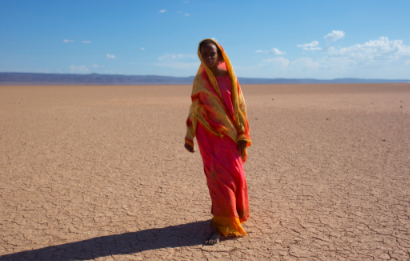
Scene in Somalia from the Movie, "Desert Flower"
When it comes to travel writing, sometimes there are much more important things to mention about in a country than the best hotel, the greatest restaurant and the off-the-beaten-track wonder. From time to time, there are issues so important that we need to do all we can to bring them into the public awareness. Somalia is one such country, and the issue is female genital mutilation (FGM), a hellacious practice in which at least 150 million women and girls in Africa, Asia, Europe, Australia and, yes, America are horribly mutilated. (In case you didn't know, it, the operation is performed on 6,000 girls in America every day). The issue was recently brought to my attention at a screening of Desert Flower which is set to open in movie theaters soon.
Watch the trailer of the film: http://www.youtube.com/watch?v=TCpXLQTQepo
Female Genital Mutilation (also known as female circumcision or cutting) is a destructive procedure in which a female's external genitalia are partly or entirely removed or injured in order to inhibit a woman's sexual feelings. A professional female circumciser or a traditional midwife usually performs FGM, though a healer, barber, nurse or doctor trained in Western medicine occasionally performs it. The procedure is usually performed without anesthesia under catastrophic hygienic circumstances. Some of the instruments used to perform the procedure are knives, scissors, razor blades or pieces of broken glass.
The mutilation is most often performed before puberty, often on girls between the age of four and eight, but recently it has been increasingly performed on girls only a couple of days, weeks or months old. After, the remaining parts of the outer lips are sewn together leaving a small hole for urine and menstrual flow. The scar is opened before intercourse or giving birth, which causes additional pain.
In many countries, girls who don't have the operation are ostracized, kicked out of their village, and may not get married. Many subjected to this cruel mutilation either bleed to death or die from infections after the cutting. For the last few decades, the World Health Organization (WHO) has made numerous efforts to end FGM. The United Nations has declared February 6 as "International Day of Zero Tolerance to Female Genital Mutilation. But the most active voice protesting FGM is Waris Dirie, whose first name means "desert flower," and whose book, Desert Flower: The Extraordinary Journey of a Desert Nomad (which became a bestseller and to date has sold 11 million copies) and is the book on which the movie is based. The movie was written and directed by Sherry Hormann, produced by Peter Herrmann, and stars top New York model Liya Kebede.
Desert Flower is the true story of Waris Dirie, a young girl whose mother tried to force her to marry a much older man at the age of 13, so she ran away and managed to find a job in London as a maid in Somalia's Embassy. When she was 18, a regime change forced her onto London's streets and from there, as a cleaning lady in a London fast food restaurant, where she was discovered by a famous British fashion photographer and soon after became an international top model. But Waris Dirie did not rest on her laurels; instead, she used her fame to fight against the cultural traditions and poverty that forced her to run away from her home and family. She has created The Desert Flower Foundation, hoping to end the crime of FGM by raising public awareness, organizing events and educational programs, and supporting victims of FGM.
From the Somali desert to the world's catwalks, Waris Dirie's story is dramatized in the movie Desert Flower, a story which I hope will impel you to take action. The movie shows the incredible journey of a young girl's nomadic life in the deserts of Somalia to a supermodel strutting on the world's most famous catwalks. In New York, at the peak of Waris' career, she is interviewed by a magazine editor who asks Waris to speak about the day that changed her life, fully expecting Waris to answer that it was the day she was discovered by the famous photographer in the fast food restaurant. But instead, Waris says the day that changed her life was the day she was five and had to suffer Female Genital Mutilation. This public acknowledgment is the beginning of Waris Dirie's role as an activist. For the past twelve years, since that interview, Waris has spoken out about this archaic ritual, has founded The Desert Flower Foundation, and dedicates her life to fighting against FGM.
Make sure you see this movie when it is released in your neighborhood. And in the meantime, help end this cruel practice. Donate: Give now. It will be the best Christmas gift you've ever given.
